12 tips to keep young players focused when playing tabletop RPGs
Jump to:
- Make stories that your kids can relate to
- Choose a skill-appropriate system
- Start at the right time
- Let your child talk and share
- Ask your kid questions
- Act out scenes from the game
- Play music
- Let your kid hold and use props or toys
- Provide rewards
- Prepare coloring sheets or puzzles
- Offer regular breaks
- Know when to wrap the game up
1. Make tabletop RPG stories that your kids can relate to
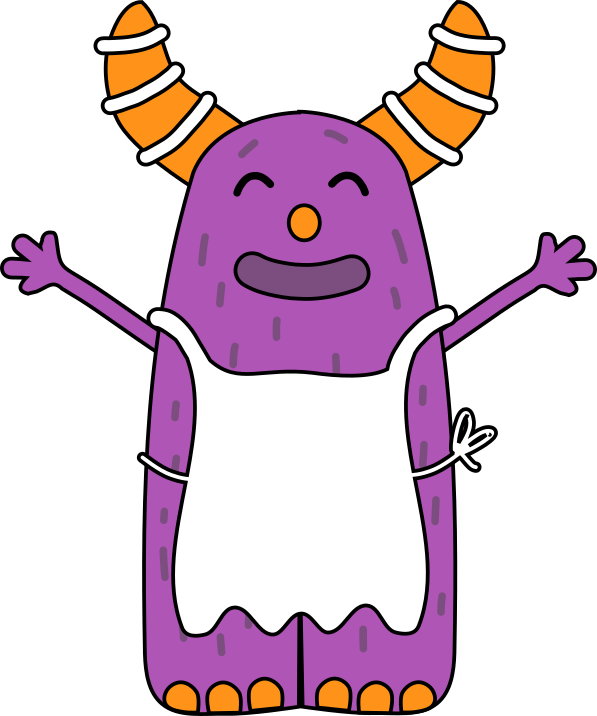
Kids are pretty open about not doing something that they don’t want to do, so unless the main theme of the story means something to them, they will probably zone out or get bored pretty quickly.
Think about what kinds of stories your kid already likes from books, TV, and other games. If they mostly have only seen Blues Clues, Dora, or Creature Cases, it might be difficult to get them to click with a tabletop RPG story about a group of adventurers meeting in a tavern to go fight a dragon. However, they might be very interested in an adventurer teaming up with their friend for a scavenger hunt across the forest, similar to the shows they watch, or about a familiar holiday that they’re excited about.
2. Choose a skill appropriate tabletop RPG system
Having game mechanics that match your child’s current skills is another core part of keeping interest in the game. Definitely, some challenges can be great for developing their skill set, but introducing too much at one time can cause frustration.
I’ve tried introducing my kid to a couple systems that ended up being a little too much. I was able to help him through it, but I could definitely see he wasn’t clicking as well when he couldn’t do all the parts on his own.
If you start with a system that is at their counting, math, and reading level, you empower your kids to be able to fully participate versus needing to help them every step. If your kids are feeling confident in their ability to play, they’re going to be a lot more likely to stay interested.
3. Start your tabletop RPG at the right time for your kid
If you know your 3yo gets angsty just before their 2:00 nap or your 6yo gets grumpy just before dinner time, it might be best to try and schedule at a different time for the first few attempts at playing. Pick a time that they’re normally relaxed and happy to introduce something new.
4. Let your child talk and share while you play
It is very important to let your child be heard. When you’re coming up with a story for them, sometimes the ideas bubble up and you really want to share the story you’ve planned. However, your kid is also going to get ideas along the way and needs to get them out of their system too.
Letting them talk and share their ideas lets your child get those ideas out so they aren’t popping around and taking their focus. It also helps them know they will be heard and seen. If this becomes a safe place for them to be acknowledged, it is a lot easier to want to participate.
5. Ask your kid questions about the tabletop RPG setting and characters
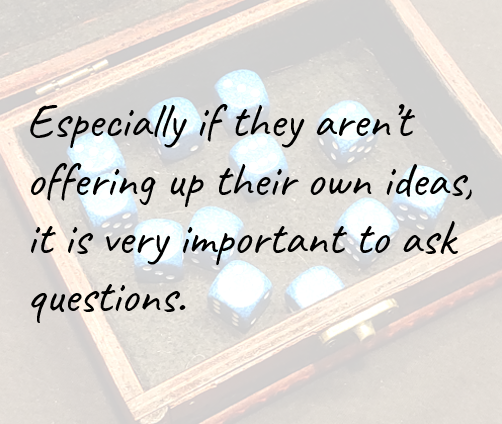
Especially if they aren’t offering up their own ideas, it is very important to ask questions. They don’t have to be complicated (i.e. should the wizard have a sandwich or a salad for lunch), but asking and then letting your kid answer shows that you value their input and want them involved. If someone feels like they are wanted, again, it becomes much easier to stay engaged.
6. Act out scenes from the game
If you can act out parts of the story with your child, it can help break up the longer talking portions and gives a good wiggle break. If there’s a chase scene, encourage them to run around for a bit. If there’s a fight scene, let them slice a paper towel tube through the air like a sword. Incorporating some kind of activity and motion can help with releasing tension, so your kids may be calmer and more interested for longer.
7. Play music while you run the game
Think of almost any movie that you’ve seen. Most have music playing to emphasize a mood and help with immersion. This can also help grab attention in games that you play with your kids too. It gives an extra element that this time is special, and it helps give something for them to focus on for a bit if they drift away from other parts. You can also try playing calm music during downtime parts of the game to help encourage taking a breather without actually saying it is time to calm down.
8. Let your kid use and hold props or toys
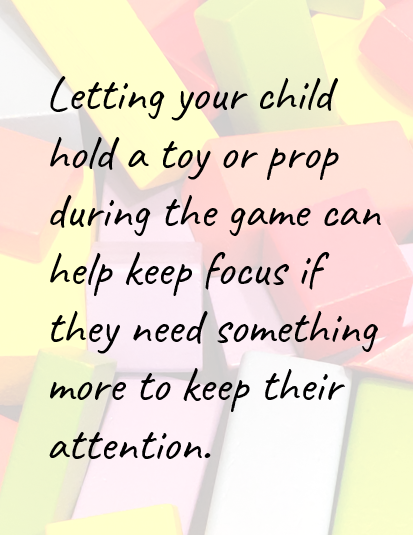
Letting your child hold a toy or prop during the game can help keep focus if they need something more to keep their attention. Engaging the touch part of their senses lets them fill in some of the attention span gaps that kids have and lets them feel like they’re more part of the play-time that you are running. You can do this by letting them hold a stuffed toy that is relevant to the game, getting them minis, letting them hold and use dice (or dice alternatives), having dress up clothes ready, using paper tubes as swords or staffs, letting them stack blocks or toys, etc. Just having SOMETHING available to let them hold and fidget with can help keep them engaged for longer periods of time.
9. Provide rewards within the tabletop RPG besides XP
If your child knows there’s prizes or rewards for continuing to play, it can also help to keep interest. In one of my other articles where I use snacks or stickers as point trackers, this really helped my kid have some additional interest in the game because he saw them as prizes to keep going for.
Making sure to give verbal rewards, like saying, “good job!” or “you did it!” can also go a long way in helping them know that they did well. It can build your kid’s confidence in being able to play the game so they’re more likely to play longer.
10. Prepare coloring sheets or puzzles
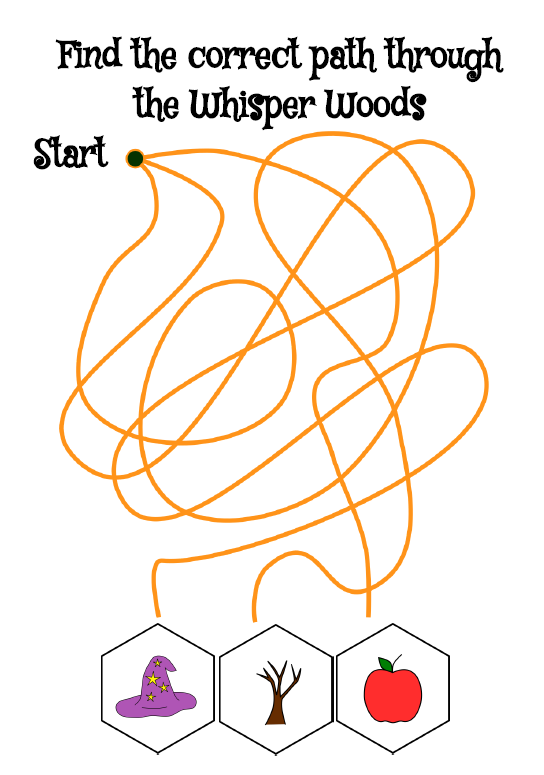
I am a huge fan of having breaks for coloring or puzzles in the middle of the game. If my kid starts getting fidgety, I can ask if he’d like to color for a bit, and that 5 minute break is enough to let him refocus. I try to have ~5 coloring sheets or little printed out games (match the letter, counting worksheet, etc) that are relevant to the topic of the game. It really helps him feel involved and want to keep going even if he’s not in the mood to answer a lot of questions that day.
11. Offer regular breaks at key game scenes
Especially when we first started playing TTRPG’s, it was really important to at least offer a break every 10 minutes or so if we weren’t also doing something else (acting the story out, coloring, etc). Just… attention spans can be limited, and trying to get him to talk along with a story for more than 10 minutes led to him getting a little bored and asking to do something else, at least when we first started (now he’ll want to go for an hour sometimes).
12. Know when to wrap the tabletop RPG session up
One of the most important parts about a child’s attention to the game is knowing when they are tapped out. Regardless of how much you put into it, they will at some point be ready to move on to a different activity, or maybe they just aren’t feeling like playing the game that day. It is important to respect that, especially if you want them to be willing to play again another day.
If they are looking bored, not wanting to participate, or are starting to get angsty, it is probably time to wrap things up versus forcing them to try and pay attention. Just know that you can pick up the story with them another time when everyone can have a fresh start.
Overall thoughts on how to keep kids focused on the game when playing tabletop RPGs:
Trying to keep a child’s attention for long enough to play through a whole story can be tough, but it definitely is possible. I hope this article helps give you some ideas to try out for when you want to run longer games with your kids and that you have fun!
If you enjoyed this article, you can check out more tips and tricks throughout the site, and make sure to subscribe to the TTRPGkids monthly newsletter to stay up to date on the latest reviews, game and podcast list updates, and more! Thank you for playing tabletop RPGs with your kids and sharing this awesome hobby with the next generation!
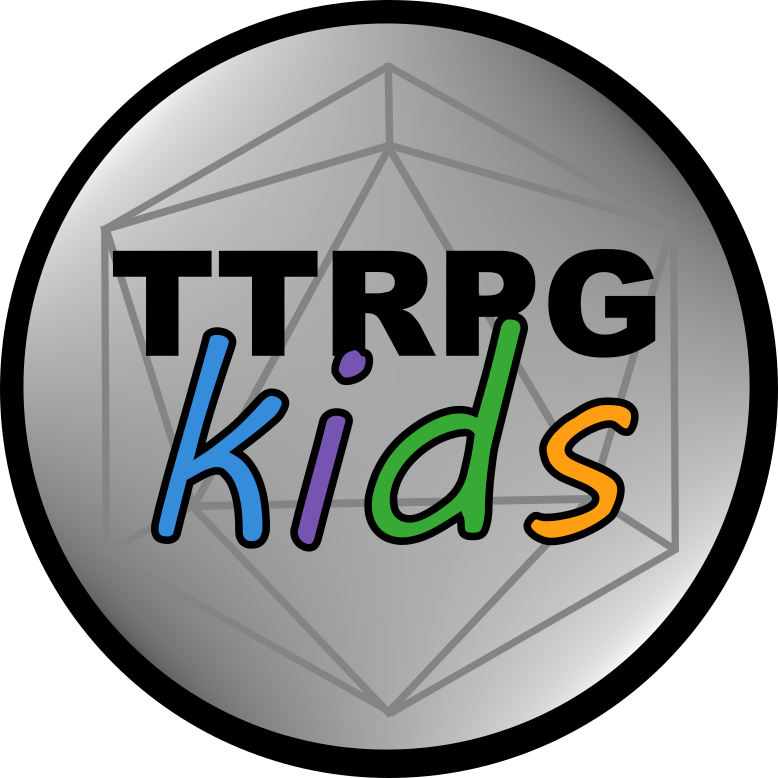


7 thoughts on “12 tips to keep young players focused when playing tabletop RPGs”